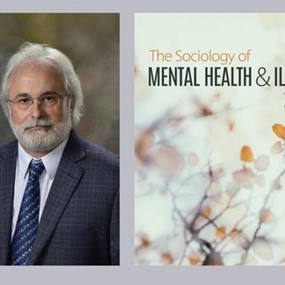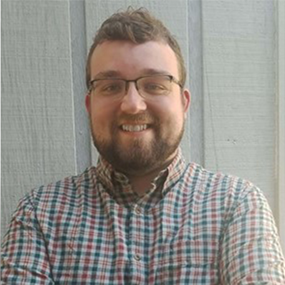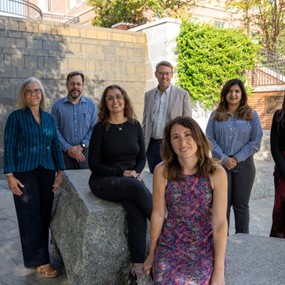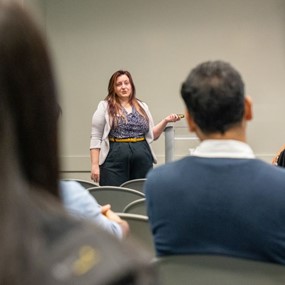Shari Williams, CLA trailblazer who made history while also studying history
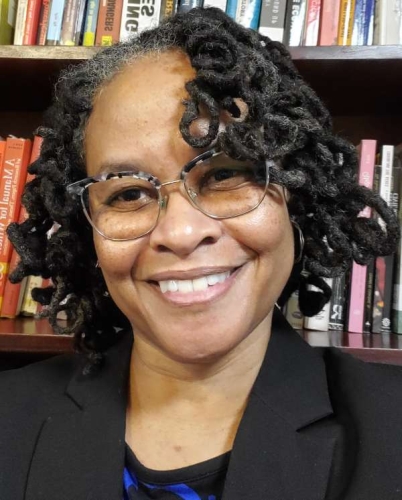
Shari L. Williams earned her PhD in history in 2020 and is the first African-American female at Auburn University to do so. Presumably there aren't many people who can say they made history while also studying history—which is clearly why Williams has earned the title of Trailblazer.
As a PhD student in the Department of History, Williams commuted to and from Auburn nearly every day from her home in Columbus, Georgia. Williams said that hour alone in her car helped her collect her thoughts after vigorous discussions that hit close to home.
"The long commute was both taxing and a blessing," Williams recalls.
Read more about her fascinating foray into the world of academic history in our interview, and how she felt to be hooded by another trailblazer during graduation.
Would you please tell us about yourself?
I was born and raised in Akron, Ohio. I currently reside in Columbus, Georgia. I married Larry Williams in 1977 while in undergraduate school at Bowling Green State University, Bowling Green, Ohio. We ended up in Columbus after eleven moves, with each relocation bringing us farther and farther south. We moved to Columbus in 2007. Larry and I have two daughters, Bethany and Jenessa, born fifteen months apart, who are now adults, and a granddaughter Ashley. Larry and I will celebrate 44 years of marriage on March 26, 2021.
What made you decide to pursue your doctorate?
The first time I ever considered pursuing a doctorate, I was attending my Master of Public Administration degree commencement in December 1991 at the University of Memphis. I was seated beside a woman who was in my cohort and we both were mesmerized while watching the doctoral hooding ceremony. We spoke in whispers to each other about the ceremony. I do not remember who said what but our conversation about the doctoral hood was, “I want one of those.” “Yeah, I want one too!”
I was thirty-five years old at the time and as life would have it, I did not enroll in a doctoral program, but the idea was planted. I had no clue about the sacrifices involved in pursuing a doctorate, but it had been difficult enough to simultaneously work full-time, complete a master’s degree program and parent adolescent daughters, so I went on to pursue a career in human resources, first in training and development, and later on the employment and employee relations side of human resources. I checked into online doctoral programs in human resources when I was in my forties, but they were super expensive and again, life intervened.
How did you choose to attend Auburn for graduate school?
In 2007, shortly after I was employed as a Human Resources Coordinator for the Muscogee County School District in Columbus, I discovered an interest in history that I suppose had always been there although not in the form of academic history. Since I can remember, I have generally been fascinated with the past. I was almost ten years into researching my family history when in 1998 I visited the village of Creek Stand in south Macon County, Alabama, for the first time. Creek Stand is where my maternal grandparents were born in the early 1900s and where my mother was born in 1928. They resided there until they migrated to Ohio between 1928 and 1930. Because of them, I initially had an unquenchable thirst for more information about the area. I gathered oral histories, read books, and collected information from the internet and from Macon County Probate Court deeds, wills, mortgages, and marriage records. Through those sources I learned about the Federal Road and Alabama Fever history of Creek Stand and the surrounding areas and discovered that my ancestor’s contributions were much more significant than I had ever imagined, including owning and farming land, founding churches, and donating land to build one and two-room schoolhouses. I also learned about the pre-historic presence there of indigenous people, the presence of the Creek Indian Nation, and the historic relationship between Creek Stand and the surrounding communities with Tuskegee Institute.
In 2009, I nominated the Creek Stand A.M.E. Zion Church cemetery to the Alabama Historic Cemetery Register. In 2011, I founded The Ridge Macon County Archaeology Project and became executive director. The Ridge Project is a 501(c)3 non-profit, all-volunteer organization that operates an Interpretive Center in Warrior Stand in Macon County, and we have an on-site archaeological pit. We offer educational programs centered on the Old Federal Road history of the area, going back to pre-historic times. While pursuing these activities I began visiting the Tuskegee University Archives, and Special Collections at Auburn University. I attended conferences and learned more about historic preservation, more about Alabama history, and about the history of the South. I was collecting a great deal of material and was suddenly dissatisfied with being an avocational historian and realized I needed to become a student of southern history. The idea to pursue a doctorate was planted in 1991 but it came to fruition when I retired from the school district officially on September 1, 2016, just a few short weeks after I began the doctoral program at Auburn. It is a good thing I entered a doctoral program twenty-five years after telling my colleague I wanted a doctoral hood. Had I pursued a doctorate in 1991, it would have been for the wrong reason, at the wrong time, and in the wrong field. When I decided to apply to a doctoral program, I was certain that I wanted to pursue a doctorate in history and that Auburn was the right place for me because of its flagship program in Southern history. I had years of life experience, the focus, and the motivation to ground me and sustain me in my determination to embark upon and complete the journey. Thankfully, the history department awarded me a teaching assistantship, and I was selected for the Southern Regional Education Board’s Doctoral Scholars Program. This financial assistance substantially decreased the financial obligation that goes with attending graduate school.
What area(s) of history did/do you study?
My major field was U.S. history since 1865 and one of my minor fields was public history. My interests are the history of the modern American South, and of course, Alabama history and especially Macon County history. I study the past, present, and future of rural historic landscapes, and cultural traditions in Alabama’s Black Belt with an emphasis on social history through the lens of race, gender, and class. I hold a graduate certificate in public history as well as a doctorate.
Did you know you’d be the first African-American female doctoral graduate in the Department of History? What did you think about making history while also studying history?
No, I did not know this when I enrolled and was accepted. During my first year I noticed a photograph of Bertis English displayed on the bulletin board in the main hallway of the Department of History. In 2006, he was the first African-American ever to receive a PhD in history from Auburn, and I wondered if and when there was a first ever African-American woman graduate. I asked one or two people in the department about it, but responses were uncertain. It seemed finding an answer would require some research, but at the time, graduation seemed to be light years away, so I tucked the question away in my mind and I did not consider seriously that I might be making history until I was approaching graduation. After I passed my dissertation defense in November 2020, I posed the question to the Office of Institutional Research and to several faculty members. I was a research assistant for Alan Meyer, history professor, and he pointed out that if no black woman had graduated with a PhD in history in the fourteen years since Bertis English had graduated, then I would be the first when I graduated the next month.
How did you feel about being hooded by Dr. Harold Franklin, who was also receiving his PhD at the same ceremony you were? In 1991, when I wished for a hood but did not pursue a doctorate, I never envisioned that I would one day complete a doctoral program and make history this way, nor did I imagine that I would be hooded by Dr. Harold Franklin, the first African-American to integrate Auburn University. What an honor it was to see my story linked to his. There were similar themes of being "firsts," but Dr. Franklin is the ultimate trailblazer. He paved the way for me and other African Americans to attend Auburn and to be visionaries. When I reflect on being the first black female to receive a doctorate in History from Auburn and the symbolism of being hooded by Dr. Franklin, my family comes to mind—my parents and grandparents, all my ancestors, my present-day immediate and extended family, and family that is in the future. I celebrate in my spirit with all of them.
What was your Auburn experience like?
After I was accepted into the program, Keith Hébert, history professor, and Tiffany Sippial, the director of graduate studies at the time, arranged for me to meet with a group of current graduate students and to meet one-on-one with several faculty members. I will always remember sitting at a round table in the corner of the GTA office with graduate students and talking with them about their experiences in the program. Several students commented on the seminar reading load stating that it could be three to five books per week or more plus as many articles, and I thought “Oh my God, what have I gotten myself into?” My shock about the reading load was tempered by everyone I met that day who was welcoming and who seemed to be genuinely interested in me and my aspirations. The collegial and supportive vibe impressed me. That vibe continued throughout my program with most everyone in the department and especially with members of my cohort. Along with my personal goals, the genuine support from my colleagues and professors helped me to navigate the rigor of the program and the everyday challenges of being a student, a GTA, and having family and other obligations. I commuted round-trip from Columbus three to five days per week depending on my own course schedule, my GTA schedule, and my office hours during any given semester. The long commute was both taxing and a blessing.
My greatest challenge throughout was having to dive into and absorb the historiography many of my colleagues had absorbed during their bachelor’s and/or master’s programs in history. The majority of the assigned readings exposed me to the history of slavery, racial oppression, oppression of women, classicism, and racism at a depth I had not previously encountered. That exposure was often gut-wrenching. I understood that as a historian I was to separate the historiography from my feelings, but it was often difficult to separate head from heart after engaging in penetrating discussion and analysis of these topics. My hour-long commute gave me the quiet time I needed to calm down after participating in a three-hour seminar class where inevitably books and articles about race, gender, and class were central to the discussion. I often spent time on the road considering the diverse views of my colleagues, most of whom had expressed their interpretations and opinions with decorum. On this side of it, it was worth every minute to participate in those discussions, even on the roughest days. My time in the program expanded the vista of my knowledge and understanding of the world and was one of the richest and most rewarding experiences of my life. It prepared me to embrace the raw discourse taking place in America and the world today about race, class, and gender. It equipped me to view these topics more objectively through an analytical and critical lens.
What has been your career path or experience(s) since graduating Auburn?
I am amazed that back in 2016, graduation seemed light years away. Now, it seems that the four and a half years I spent in the program went by at the speed of light. During that time, I always had a post-graduate end goal in mind—to pick up where I left off with The Ridge Project. After graduation, I immediately resumed projects for The Ridge full-time, but I was surprised that I also felt a bit lost, like I was wondering around in a dense forest with no compass. I confided in David Carter, my advisor and several dissertation committee members, my good friend and mentor Renny McLeod who is a retired history professor, and my brother Cedric Sanders, a 2018 University of Georgia PhD graduate. They all encouraged me to be kind to myself and to know that it is normal to feel lost post-graduation. I am presently working through this adjustment period and building a structure around my daily existence to replace the structure that came organically with being a graduate student. Thank goodness I am establishing a routine to tackle my lengthy to-do list. My career path will definitely include a mix of public and academic history. I am co-developing projects and programs for The Ridge Project to include developing virtual classroom resources to offer to teachers. The Ridge Project has produced one podcast, and we are in production on the next one. We recently launched an updated website. I am seeking grants and opportunities to build an endowment fund for The Ridge Project. I am writing a book proposal towards a goal of revising my dissertation into a book manuscript. I want to teach on an adjunct basis at some point. I have been contracted to do a research project, and I have emerging opportunities to lecture to college students and to present to public audiences. I am serving as a volunteer consultant on several historic preservation projects.
What are your ultimate career goals?
Publishing a book, developing The Ridge Project’s Interpretive Center to be a sustainable educational and tourism site, and teaching or lecturing are at the top my list of goals. I know things happen for a reason in due time and during the right season of life, but sometimes I do wish I had pursued a doctorate when I was in my thirties. This is because I want my research and scholarship to contribute to social and racial justice, but there is so much “boots on the ground work” to be done on that front and at this juncture of my life there are some limitations on my stamina to be on the front line and in the trenches. Nevertheless, I am committed to contributing in whatever ways I can. I will be fulfilled most if for the remainder of my career, I can help young African-Americans to understand the past in relation to the present and inspire them to imagine the kind of future for themselves as historians and historic preservationists that took me over half my life to envision.
Tags: Research Alumni History Diversity, Equity, and Inclusion

